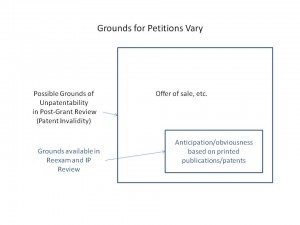Estoppel in Post-Grant Review (cont'd)
 In the previous post we discussed some aspects of post-grant review (PGR) in the current bill before the Senate. The grounds available for petition in PGR are more comprehensive than those available for traditional reexamination and and also for the grounds of petition slated for inter partes review. So if the estoppel is on grounds that “Petitioner raised or reasonably could have raised during that post-grant review” then the estoppel arising from PGR is likely to be broader than other post-grant procedures (click on graphic above to enlarge). That means a petitioner of a post-grant review has a lot to think about before filing a petition.
In the previous post we discussed some aspects of post-grant review (PGR) in the current bill before the Senate. The grounds available for petition in PGR are more comprehensive than those available for traditional reexamination and and also for the grounds of petition slated for inter partes review. So if the estoppel is on grounds that “Petitioner raised or reasonably could have raised during that post-grant review” then the estoppel arising from PGR is likely to be broader than other post-grant procedures (click on graphic above to enlarge). That means a petitioner of a post-grant review has a lot to think about before filing a petition.
For example, assume that a petitioner in post-grant review has printed publication prior art that is expected to be novelty destroying and files a petition for PGR based on that alone. Should that fail, the petitioner may have a hard time asserting other known offer-of-sale evidence in litigation if petitioner could have raised that ground in its post-grant review petition.
So, should a petitioner refrain from PGR and rely on other post-grant review if asserting only grounds that could have been asserted in reexamination or inter partes review? That is a fair question, but it cannot be answered without a complete review of the entire evidence available to the Petitioner. And it needs to be answered with great detail and attention to any privy or real party in interest of the petitioner.
Now assume that a petitioner in post-grant review has evidence that challenges validity of the patent, but that could not be introduced into a reexamination proceeding. Further assume that the petitioner files a petition for PGR based on that evidence alone. Should that fail, the petitioner may have a hard time asserting known publication prior art evidence in litigation if petitioner could have raised that ground in its post-grant review petition.
So the current estoppel provisions for post-grant review are complicated and challengers of patents need to carefully collect knowledge about the patent and the prior art before any decision can be made. Would-be petitioners have to weigh the costs and benefits of PGR versus other post-grant procedures and any ultimate impact of estoppel on subsequent post-grant procedures and on litigation.
Back to All Resources

